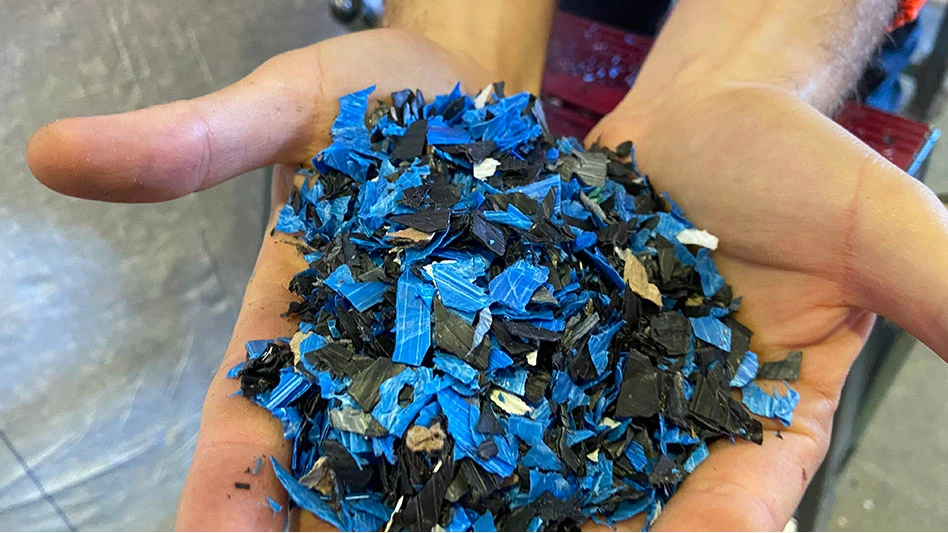
Recycling Today archives
Several presenters at the Plastics Committee meeting at the Bureau of International Recycling (BIR) fall 2023 World Recycling Convention & Exhibition portrayed investments and new technologies designed to raise the global plastic recycling rate.
At the late-October event in Abu Dhabi, United Arab Emirates (UAE), Carlos Monreal, founder and chief executive of London-based Plastic Energy observed that plastic continues to be produced at record rates globally and said chemical recycling, sometimes referred to as advanced recycling, is a way to boost recycling of the material.
“We have to remember that [the world] is manufacturing more than 1 million metric tons of plastic every single day, and those volumes can only increase and are most likely to triple by 2050,” Monreal said. “Plastic is a great material—otherwise that demand would not be happening. But we have to address both the recycling rates and the carbon footprint of the industry.”
Monreal said chemical recycling is not in competition with mechanical recycling. "It’s not in a fight for feedstock," he said.
Plastics Energy’s two plants in Spain were described by the CEO as "plastics-to-plastics” rather than plastics-to-fuel operations, and Monreal was adamant they will play a role in the sector’s future. Chemical recycling technologies can best focus on hard-to-recycle end-of-life plastics that cannot be processed by mechanical recycling rather than opting for feedstocks such as postindustrial plastics that are handled by the mechanical recycling sector.
He contends that mechanical recycling alone cannot cope with the growth in plastics but also said chemical recycling is not “a silver bullet.”
Monreal said 30 million metric tons of discarded plastic packaging are collected annually in Europe, of which 10 million metric tons are mechanically recovered (producing 5 million to 6 million metric tons of recycled-content plastics.
With most of the rest either going to waste-to-energy plants or landfills, Monreal said, “After 25 years of mechanical recycling in Europe, we have increased collection but still recycle only 5 million metric tons.”
He spoke in favor of requirements for mandatory levels of recycled content in new packaging, regardless of the material involved. He said recyclers were doing their job well, but market prices were low and inventories were high, so “the market is not working properly.”
BIR Plastics Committee member Max Craipeau of Hong Kong-based Greencore Resources, who chaired the session, and Alev Somer, trade and environment director of BIR, expressed support that chemical recycling investments should focus on ensuring the two methodologies are complementary and not competing for the same material.
“Where we cannot mechanically recycle, we should continue with this [Plastic Energy],” Somer said. “We also need to raise concerns about those who are trying to cover their investments in chemical recycling by taking feedstock from mechanical recyclers.”
Craipeau also is investing to boost global plastic recycling rates, but in his case via the creation of a new reverse vending machine (RVM) for PET beverage bottles.
The Asia-based recycler introduced BOTOL, his RVM line, recently in Vietnam. The patented RVM designed in Singapore identifies PET bottles by brand, and within the interior of the machine creates color-sorted rPET flakes eligible for food-grade recycling, Craipeau said.
The RVM’s ability to accept and shred bottles for more efficient transport is intended to create a tenfold reduction in CO2 emissions by reducing truck trips, he said.
The recycler said BOTOL is the first RVM member of Vietnam's Packaging Recycling Organization and the use of the machines is expanding next to Indonesia, where Greencore Resources has a PET reprocessing plant.
Another guest speaker, Jerome Viricel, general manager of Recapp in the UAE, spoke about the Veolia-affiliated firm’s efforts in encouraging recycling through an app and website serving Dubai.
“This is a full digital ecosystem with interaction between the consumer and the recycler thanks to a digital tool,” Viricel said. The tool’s ability to link collection points, quantity and the identity of those providing materials into the postconsumer recycling stream together offers “an amazing database of consumption and behavior."
The company has developed an awareness program in 89 Dubai schools and has offered free workshops and collection boxes sponsored by major brands. Viricel said the app had 70,000 people accessing it over the past two-and-a-half years. “Everything is improved because the digital tool allows us to talk to people and make them aware,” he said, adding Recapp was looking to expand the system to Oman and Saudi Arabia.
A presentation by Somer of the BIR touched on the proposed United Nations Treaty on Plastics, with Somer saying conflicting interests have meant little progress was made at the latest UN Intergovernmental Negotiating Committee meeting in Paris in June.
The goal is for the treaty to be signed by 2025 but, with three meetings to go, Somer said that seems ambitious. A “zero draft” has been proposed with no formal content in an effort to shape the debate at the next negotiating meeting in November and to make some progress on the treaty text.
Latest from Recycling Today
- BMW Group, Encory launch 'direct recycling’ of batteries
- Loom Carbon, RTI International partner to scale textile recycling technology
- Goodwill Industries of West Michigan, American Glass Mosaics partner to divert glass from landfill
- CARI forms federal advocacy partnership
- Monthly packaging papers shipments down in November
- STEEL Act aims to enhance trade enforcement to prevent dumping of steel in the US
- San Francisco schools introduce compostable lunch trays
- Aduro graduates from Shell GameChanger program





